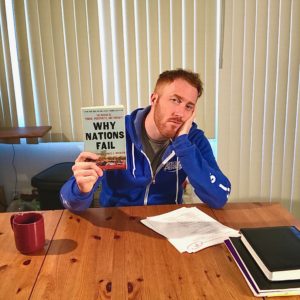 Why do nations fail? Is it war or famine or simply bad leadership? Is it cultural or geographical or something else entirely? In their book Why Nations Fail, Daron Acemoglu and James A. Robinson posit that it is due to a certain kind of political and economic structuring of a country. There are essentially two different ways to do it: inclusively and extractively. They write that “inclusive economic institutions are those that allow and encourage participation by the great mass of people in economic activities that make best use of their talents and skills and that enable individuals to make the choices they wish.” This is best characterized by free market capitalism, which is what we have in the United States and the western industrialized world. It is also defined by democracy, a system in which every citizen casts a vote and has a say in who runs things and how they do so. On the other hand, “extractive political institutions concentrate power in the hands of a narrow elite and place few constraints on the exercise of this power.” Think old school monarchy, with a king or queen exercising absolute power, or new school communism which consistently has been shown to operate in dictatorial ways (ie. The Soviet Union under Stalin or modern day China under Xi Jinping.)
Why do nations fail? Is it war or famine or simply bad leadership? Is it cultural or geographical or something else entirely? In their book Why Nations Fail, Daron Acemoglu and James A. Robinson posit that it is due to a certain kind of political and economic structuring of a country. There are essentially two different ways to do it: inclusively and extractively. They write that “inclusive economic institutions are those that allow and encourage participation by the great mass of people in economic activities that make best use of their talents and skills and that enable individuals to make the choices they wish.” This is best characterized by free market capitalism, which is what we have in the United States and the western industrialized world. It is also defined by democracy, a system in which every citizen casts a vote and has a say in who runs things and how they do so. On the other hand, “extractive political institutions concentrate power in the hands of a narrow elite and place few constraints on the exercise of this power.” Think old school monarchy, with a king or queen exercising absolute power, or new school communism which consistently has been shown to operate in dictatorial ways (ie. The Soviet Union under Stalin or modern day China under Xi Jinping.)
The prosperity of any modern country can be traced back through its history to find the places where critical junctures shaped its institutions. There is a reason why the industrial revolution happened in England, which was one of the first societies to become a politically and economically inclusive one. That reason is the Black Death, which decimated the global population as it swept through Europe and much of the world in the mid 1300’s. In its aftermath, Europe embraced feudalism, which was a system in which the king ruled the land. He granted it to the nobility in exchange for military service, and the peasantry, who’s job it was to work the land, was subject to their will. The peasantry, or serfs, as they were called, were tied to their land, subjected to heavy taxes, and had no say in the matter. All of the wealth flowed up to the nobility and king who were the judge, jury, and police force, and dissenters were harshly punished and often killed. The Black Death changed this because it brought a scarcity of labor, and all of a sudden the serfs at the bottom of the totem pole found themselves in higher demand. In England, (and parts of Western Europe) this allowed them to make demands of their own, and they slowly began to fight for and win small freedoms like increases to their wages and more personal liberties. Fast forward a few hundred years, and the differences between Eastern and Western Europe were vast. While Western Europe had been making incremental changes in favor of their lower classes of people, Eastern Europe had been doing the opposite and increasingly oppressing its peasantry.
Another critical juncture for Europe was the colonization of the new world and the prosperity of the Atlantic trade routes. While the monarchies of Spain and France profited greatly due to their monopoly of the sea trade, the merchant class of England was not tied to the Crown and was able to profit independently. This independent accumulation of wealth then lead to the spread of economic opportunities to more and more people. Once people gained the ability to enrich themselves, they saw reason to work harder and began to innovate. It is here where such inventions as the steam engine, spinning Jenny, and power loom were conceived and the Industrial Revolution took off.
So, nations that give their people economic incentives and include their citizenry in politics are prosperous, and those that don’t aren’t (or at least are considerably less so.) The biggest problem is that once a society is structured into one of these two ways (inclusive or extractive) it is nearly impossible to break out of the cycle. Sub-Saharan Africa is still overwhelmingly characterized by poverty because of their vicious cycle of extractive political and economic policies. When European settlers colonized the continent, they set up systems of oppression where they were in control and the African people were forced into slavery. Then, as European nations departed—ostensibly to grant these numerous African nations their freedom—their own local chiefs took over the same institutions that had been set up by the colonists and continued their extractive nature. This is also evident in the relative poverty of Latin America compared to the United States. When Spanish conquistadors came across the Incan people of modern day Ecuador, Peru, Western Brazil, and Bolivia, they found a giant populace of people at their disposal. They proceeded to set up a system of abject slavery, where the local people worked and died in the gold and silver mines of the area and the proceeds were shipped back to enrich Spain. Contrast this with the colonization of North America by the English, and you get a different picture. When early settlers first arrived and founded Jamestown in 1607, they were faced with an entirely different landscape; there simply were not enough natives to force into labor. When the English crown then attempted to force the settlers themselves to do the backbreaking work, they fought for and eventually won a different social order. This order gave ownership of the land to the people, and not to the elite. They gained a modicum of economic freedom which paved the way for the foundation of our modern democracy. (Keep in mind that these changes took hundreds of years to accomplish with hardships all along the way.) You can still see it, however, in the prosperity of the United States today compared with the penury of Latin America.
Once you understand the workings of these two differing societal structures, you begin to see them everywhere. These two philosophies were the foundation of the Cold War, in which westernized free market capitalism and democracy opposed communism. Why do you think South Korea is prosperous and North Korea is desolate? These two philosophies were also at odds in our American Civil War, in which the north believed in inclusive social practices, industrialization, and urbanization, while the south believed in an economy built upon the backs of slaves. Even though the north won, the southern elite remained in power and continued their extractive political practices via the Jim Crow era, and more recently through continued mass incarceration under the guise of the war on drugs.
Here in the United States, our governmental and corporate elites have long been busy trying to keep more for themselves and give less to the rest (why do you think Amazon paid zero dollars in taxes in 2019?) The only difference is that they do it with pens instead of swords. Take, for a current example, the debate about minimum wage. Democrats say we need a $15 dollar minimum wage because anything less isn’t enough to live on. They also want things like government sponsored healthcare, which means an increase in taxes taken from that $15. Republicans, on the other hand, want a lower minimum wage, while they also want to take less taxes out of your paycheck—their argument being more money in your pocket and therefore more financial freedom. Both of these parties are trying to solve the same problem in different ways, that problem being not enough money for the worker. The real problem is that people earning any minimum wage cannot afford to live in our society. That is because the elites at the top of the pyramid have structured society in such a way as to extract the wealth created by the working class at the bottom and deliver it to top. They enjoy their yachts and private planes while the laborers bicker over a measly minimum wage. The truth is that there is more than enough money to go around for everyone to live comfortably, it is just not allocated in the right place.
Similar to how the Black Death of the 1300’s was a major global turning point that led to inclusive policies in England and extractive ones in Eastern Europe, I believe that Covid-19 is ours. We have already seen how some countries are continually providing for their people while ours is ‘bailing out’ big businesses. The gap between rich and poor in this country has never been more evident. In their book, our authors write that: “inclusive institutions are based on constraints on the exercise of power and on a pluralistic distribution of political power in society, enshrined in the rule of law.” While our founding fathers were well aware of this, and set up a society in which power was broadly distributed, the last 250 years have seen the elites of this country slowly but surely accumulate that power while the rest of us are kept exhausted with longer and longer work hours. From the slave traders of the 1700’s, to the robber barons of the late 1800’s, to the media proprietors of today, the people at the top have continually been working towards enriching themselves at the expensive of everyone else.
Acemoglu and Robinson write that “the fact [is] that the main obstacle to the adoption of policies that would reduce market failures and encourage economic growth is not the ignorance of politicians but the incentives and constraints they face from the political and economic institutions in their societies.” Essentially, what they are saying is that we should not blame the politicians themselves, for they are just acting within the system as it exists. (Don’t hate the player, hate the game.) It is human nature to hold on to what you’ve got and try to get more. Greed is the norm, generosity and compassion the exception. What we need to do is stand up against any system that exploits its people and extracts its resources and labor, and continually fight for an inclusive one in which people’s voices are heard and their freedoms are respected. This change will only happen gradually and painfully, but the alternative is literally the failure of our nation.


